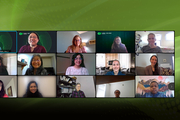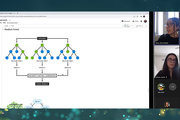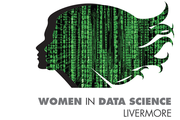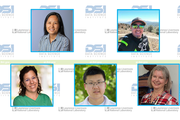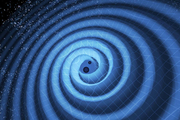Did you know we have a monthly newsletter? View past volumes and subscribe.
Skywing: Open-source software aids collaborative autonomy applications
Jan. 25, 2023 -
A new software developed at LLNL, and known as Skywing, provides domain scientists working to protect the nation’s critical infrastructure with a high-reliability, real-time software platform for collaborative autonomy applications. The U.S. modern critical infrastructure—from the electrical grid that sends power to homes to the pipelines that deliver water and natural gas and the railways...
New HPC4EI project to create 'digital twin' models for aerospace manufacturing
Jan. 19, 2023 -
A partnership involving LLNL aimed at developing “digital twins” for producing aerospace components is one of six new projects funded under the HPC for Energy Innovation (HPC4EI) initiative, the Department of Energy’s Office of Energy Efficiency and Renewable Energy announced. Sponsored by the HPC4Manufacturing (HPC4Mfg) Program, one of the pillars of HPC4EI, the collaboration between LLNL...
National Ignition Facility achieves fusion ignition
Dec. 13, 2022 -
The U.S. Department of Energy (DOE) and DOE’s National Nuclear Security Administration (NNSA) today announced the achievement of fusion ignition at LLNL—a major scientific breakthrough decades in the making that will pave the way for advancements in national defense and the future of clean power. On Dec. 5, a team at LLNL’s National Ignition Facility (NIF) conducted the first controlled...
LLNL researchers win HPCwire award for applying cognitive simulation to ICF
Nov. 17, 2022 -
The high performance computing publication HPCwire announced LLNL as the winner of its Editor’s Choice award for Best Use of HPC in Energy for applying cognitive simulation (CogSim) methods to inertial confinement fusion (ICF) research. The award was presented at the largest supercomputing conference in the world: the 2022 International Conference for High Performance Computing, Networking...
Understanding the universe with applied statistics (VIDEO)
Nov. 17, 2022 -
In a new video posted to the Lab’s YouTube channel, statistician Amanda Muyskens describes MuyGPs, her team’s innovative and computationally efficient Gaussian Process hyperparameter estimation method for large data. The method has been applied to space-based image classification and released for open-source use in the Python package MuyGPyS. MuyGPs will help astronomers and astrophysicists...
ESGF launches effort to upgrade climate projection data system
Oct. 5, 2022 -
The Earth System Grid Federation (ESGF), a multi-agency initiative that gathers and distributes data for top-tier projections of the Earth’s climate, is preparing a series of upgrades that will make using the data easier and faster while improving how the information is curated. The federation, led by the Department of Energy’s Oak Ridge National Laboratory in collaboration with Argonne and...
LLNL team claims top AI award at international symbolic regression competition
Aug. 16, 2022 -
An LLNL team claimed a top prize at an inaugural international symbolic regression competition for an artificial intelligence (AI) framework they developed capable of explaining and interpreting real-life COVID-19 data. Hosted by the open source SRBench project at the 2022 Genetic and Evolutionary Computation Conference (GECCO), the competition had two tracks—synthetic and real-world—and...
Lab researchers win top award for machine learning-based approach to ICF experiments
Aug. 4, 2022 -
The IEEE Nuclear and Plasma Sciences Society (NPSS) announced an LLNL team as the winner of its 2022 Transactions on Plasma Science Best Paper Award for their work applying machine learning to inertial confinement fusion (ICF) experiments. In the paper, lead author Kelli Humbird and co-authors propose a novel technique for calibrating ICF experiments by combining machine learning with...
An open-source, data-science toolkit for energy: GridDS
Aug. 2, 2022 -
As the number of smart meters and the demand for energy is expected to increase by 50% by 2050, so will the amount of data those smart meters produce. While energy standards have enabled large-scale data collection and storage, maximizing this data to mitigate costs and consumer demand has been an ongoing focus of energy research. An LLNL team has developed GridDS—an open-source, data-science...
Defending U.S. critical infrastructure from nation-state cyberattacks
July 21, 2022 -
For many years, LLNL has been conducting research on cybersecurity, as well as defending its systems and networks from cyberattacks. The Lab has developed an array of capabilities to detect and defend against cyberintruders targeting IT networks and worked with government agencies and private-sector partners to share its cybersecurity knowledge to the wider cyberdefense community. LLNL has...
Introduction to deep learning for image classification workshop (VIDEO)
July 6, 2022 -
In addition to its annual conference held every March, the global Women in Data Science (WiDS) organization hosts workshops and other activities year-round to inspire and educate data scientists worldwide, regardless of gender, and to support women in the field. On June 29, LLNL’s Cindy Gonzales led a WiDS Workshop titled “Introduction to Deep Learning for Image Classification.” The abstract...
Assured and robust…or bust
June 30, 2022 -
The consequences of a machine learning (ML) error that presents irrelevant advertisements to a group of social media users may seem relatively minor. However, this opacity, combined with the fact that ML systems are nascent and imperfect, makes trusting their accuracy difficult in mission-critical situations, such as recognizing life-or-death risks to military personnel or advancing materials...
Livermore WiDS provides forum for women in data science
March 18, 2022 -
LLNL celebrated the 2022 Global Women in Data Science (WiDS) conference on March 7 with its fifth annual regional event, featuring workshops, mentoring sessions and a discussion with LLNL Director Kim Budil, the first woman to hold that role. For the second straight year, the WiDS Livermore event was entirely virtual due to the COVID-19 pandemic. Attendees tuned in to view talks and...
Winter hackathon meets WiDS datathon
March 9, 2022 -
Sponsored by the DSI, LLNL’s winter hackathon took place on February 16–17. Hackathons are 24-hour events that encourage collaborative programming and creative problem solving. In addition to traditional hacking, the hackathon included a special datathon competition in anticipation of the Women in Data Science (WiDS) conference on March 7. Hackathon and datathon participants presented their...
WiDS Livermore returns on March 7
Feb. 10, 2022 -
We are hosting our 5th WiDS Livermore regional event to encourage our community of women in computing. We will watch the WiDS Stanford Livestream as well as feature Lab-focused technical talks, mentoring breakout sessions, and a career panel.
WiDS Livermore is an independent event hosted by LLNL Ambassadors as part of the annual Women in Data Science (WiDS) Worldwide conference organized by...
Career panel spotlights diversity, equity, and inclusion
Nov. 19, 2021 -
The DSI’s career panel series continued on November 3 with a session highlighting diversity, equity, and inclusion (DEI) as well as the Lab’s DEI-focused employee resource groups (ERGs). ERGs are sponsored by LLNL’s Office of Strategic Diversity and Inclusion Programs.
Moderator Anh Quach, member of the Asian Pacific American Council (APAC), was joined by four panelists: Raul Viera Mercado...
LLNL-led team uses machine learning to derive black hole motion from gravitational waves
Nov. 9, 2021 -
To understand the motion of binary black holes, researchers have traditionally simplified Einstein’s field equations and solved them to calculate the emitted gravitational waves. The approach is complex and requires expensive, time-consuming simulations on supercomputers or approximation techniques that can lead to errors or break down when applied to more complicated black hole systems.
Alo...
Summer scholar develops data-driven approaches to key NIF diagnostics
Oct. 20, 2021 -
Su-Ann Chong's summer project, “A Data-Driven Approach Towards NIF Neutron Time-of-Flight Diagnostics Using Machine Learning and Bayesian Inference,” is aimed at presenting a different take on nToF diagnostics. Neutron time-of-flight diagnostics are an essential tool to diagnose the implosion dynamics of inertial confinement fusion experiments at NIF, the world’s largest and most energetic...
Tackling the COVID-19 pandemic
Oct. 11, 2021 -
To help the U.S. fight the COVID-19 pandemic, LLNL did what it does best: quickly bring together interdisciplinary teams and diverse technologies to address urgent national challenges. This effort includes applying advanced high-performance computing resources to biological research and anayzing complicated computer models and enormous datasets. Read more in Science & Technology Review.
Data Science Challenge welcomes UC Riverside
Oct. 11, 2021 -
Together with LLNL’s Center for Applied Scientific Computing (CASC), the DSI welcomed a new academic partner to the 2021 Data Science Challenge (DSC) internship program: the University of California (UC) Riverside campus. The intensive program has run for three years with UC Merced, and it tasks undergraduate and graduate students with addressing a real-world scientific problem using data...













